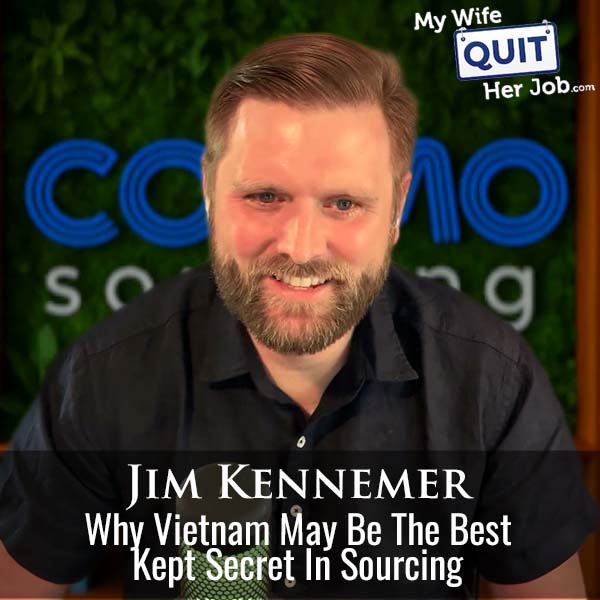603: Why Vietnam May Be The Best Kept Secret In Sourcing With Jim Kennemer

```html Vietnam Emerges as a Key Alternative to China for E-commerce Sourcing Amid Trade Uncertainties
Amidst ongoing trade tensions and fluctuating tariff landscapes, Vietnam is increasingly being recognized as a viable and often advantageous alternative to China for e-commerce product sourcing. A recent episode of the "My Wife Quit Her Job" podcast, featuring Steve Chou and Jim Kennemer, founder of Cosmosourcing and sourcinghub.io, delved into the intricacies of sourcing from Vietnam, highlighting its potential benefits and challenges for online businesses.
Shifting Sands of Global Sourcing
For years, China has been the dominant force in global manufacturing and sourcing. However, rising labor costs, increasing tariffs, and geopolitical uncertainties have prompted businesses to explore alternative sourcing destinations. Vietnam, with its growing manufacturing capabilities, competitive labor costs, and strategic location, has emerged as a frontrunner in this shift.
Kennemer, who has extensive experience working with factories and suppliers in Vietnam, emphasizes that while China remains a significant player, Vietnam offers unique advantages, particularly in specific sectors. He notes that many sellers are now actively seeking to diversify their supply chains to mitigate risks associated with over-reliance on a single country.
Vietnam's Strengths: Apparel, Textiles, and Flexibility
According to Kennemer, Vietnam excels in apparel and textile manufacturing. "Apparel and textiles, cut and sew items in general are better in Vietnam flat out, without tariffs being factored in," he states. He estimates that Vietnam boasts over 6,000 factories employing over two million people in this industry, making it a highly developed and competitive sector.
Beyond apparel, Vietnam is also gaining traction in other industries, including furniture, electronics, and footwear. Its ability to offer competitive pricing, coupled with a more flexible and responsive manufacturing environment, makes it an attractive option for businesses seeking greater control and agility in their supply chains.
Minimum Order Quantities (MOQs): Setting Realistic Expectations
One of the key considerations for businesses considering sourcing from Vietnam is the Minimum Order Quantity (MOQ). Kennemer acknowledges that Vietnam generally has higher MOQs compared to China, particularly for first-time buyers. For apparel, MOQs typically range around 1,000 units, while furniture often requires a container load, which can be anywhere from 100 to 400 units.
However, he notes that these MOQs can vary depending on the product, factory, and specific circumstances. It is essential for businesses to conduct thorough research and negotiate with suppliers to find the most suitable terms.
Navigating the Tariff Landscape: Uncertainty and Adaptation
The podcast episode also addressed the complex and ever-changing tariff landscape. Kennemer highlighted the uncertainty surrounding tariffs, particularly those impacting goods from China and Vietnam. He noted that recent comments and social media posts from political figures have created confusion and anxiety among businesses, making it difficult to make informed sourcing decisions.
According to Dr. Anya Goldrath, a supply chain management professor at the University of California, Berkeley, "The current tariff environment is creating significant challenges for businesses. The lack of clarity and predictability makes it difficult to plan and manage supply chains effectively. Diversification and exploring alternative sourcing destinations like Vietnam are becoming increasingly important strategies for mitigating risk."
The Role of AI in Sourcing
Interestingly, Kennemer also discussed the growing role of AI chatbots in driving traffic and generating leads for his sourcing business. He revealed that his company, Cosmosourcing, is experiencing a surge in traffic from AI chatbots, which are proving to be highly effective in converting visitors into meetings and sales.
This highlights the increasing importance of leveraging technology and innovative marketing strategies in the competitive world of global sourcing.
Expert Perspective: A Cautious but Optimistic Outlook
Dr. David Nguyen, an economist specializing in Southeast Asian trade at Harvard University, offers a balanced perspective on Vietnam's potential. "Vietnam presents a compelling alternative to China for many businesses, but it is not a panacea," he cautions. "While its manufacturing capabilities are growing rapidly, it still faces challenges in terms of infrastructure, skilled labor, and regulatory compliance. Businesses need to conduct thorough due diligence and develop strong relationships with reliable suppliers to succeed."
Despite these challenges, Dr. Nguyen remains optimistic about Vietnam's long-term prospects. "With continued investment in infrastructure and education, Vietnam has the potential to become a major manufacturing hub and a key player in the global supply chain," he concludes.
Conclusion: A Strategic Opportunity for E-commerce Businesses
As the global sourcing landscape continues to evolve, Vietnam presents a strategic opportunity for e-commerce businesses seeking to diversify their supply chains, mitigate risks, and access competitive pricing. While challenges remain, the country's growing manufacturing capabilities, favorable business environment, and strategic location make it an increasingly attractive alternative to China. By carefully considering MOQs, navigating the tariff landscape, and conducting thorough due diligence, businesses can unlock the potential of sourcing from Vietnam and gain a competitive edge in the global marketplace. ```
Originally sourced from: WifeQuitHer Job
